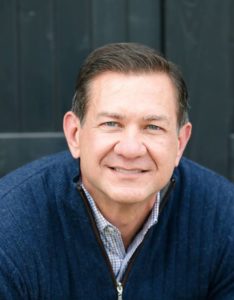Six months after he stood by a staff member accused of past sexual assault of a teenager, the founding pastor of a megachurch in Memphis, Tennessee, has resigned.
Lead Pastor Chris Conlee and trustees of Highpoint church released a joint statement this week to church members announcing Conlee is stepping down from the congregation he founded in 2002.
“It is with profound sorrow that we share with you the news that Chris has resigned as lead pastor of Highpoint,” said the statement, posted on social media by a church member.

Chris Conlee
The resignation announcement made no mention of the #MeToo controversy that has engulfed Highpoint Church since Teaching Pastor Andy Savage confessed in January to “a sexual incident with a female high school senior” 20 years earlier when he was on staff at a church in Texas.
Conlee, seated beside Savage, told the congregation “the information is not new to me or our leadership” and that elders, pastors, staff and trustees at Highpoint remained “100 percent committed” to Savage continuing his ministry there.
The congregation responded to the scripted confession with a standing ovation, prompting headlines in the secular press and shifting focus of the then-developing scandal of sexual abuse and dismissals of powerful men in media and politics to #ChurchToo by exposing coverups of similar things alleged to have happened in evangelical Christianity.
Jules Woodson, who earlier had shared her story of how Savage allegedly demanded sexual favors after driving her to a remote area before dropping her off at home after Bible study on two Christian blogs, watched and reacted to the video of Savage’s statement in a video New York Times interview headlined: “I was assaulted. He was applauded.”
Savage resigned in March, and after an internal investigation church leaders acknowledged the congregation had been “defensive rather than empathetic” in its initial reaction to Woodson’s testimony.
This week’s statement said after discussing it for a couple of months, Conlee and the trustees “arrived at a point of agreeing to go in different directions for the kingdom.”
“As any organization matures, it is important to match its evolving needs with the right combination of leaders for each stage of growth,” the joint statement said. “Likewise, every leader must steward his or her unique strengths and callings in life.”
“From the beginning, God has called Chris to be a ministry innovator and pioneer,” church leaders said.
The statement by trustees said shifting their ministerial search from a teaching pastor to replace Savage to a new senior pastor will yield a stronger pool of candidates. It will also allow the church to streamline its ministry priorities.

Jules Woodson and Andy Savage at Woodlands Parkway Baptist Church, now known as StoneBridge Church, in The Woodlands, Texas.
Woodson said in a statement to the Watchkeep blog that she thinks Conlee’s resignation “was a necessary step” and she is grateful he is no longer in the pulpit but wonders why it took six months to come to that realization.
“As #ChurchToo stories continue to pop up in headlines nationwide, (i.e. Bill Hybels, Frank Page, Paul Pressler, Mark Aderholt, to name a few), people are beginning to understand how damaging and traumatizing clergy sexual abuse can be,” Woodson said. “It is a gross abuse of power that violates victims physically, emotionally and spiritually. However, churches continue to minimize abuse by handling reports internally and with toxic theology that focuses on cheap grace and forgiveness over accountability and justice.”
Conlee is a graduate of Mid-America Baptist Theological Seminary in Cordova, Tennessee, a school started in the 1970s as a conservative alternative to Southern Baptist Convention seminaries that is located across the street from Bellevue Baptist Church, an SBC congregation led by former SBC President Steve Gaines.
Though Highpoint identifies as a non-denominational church, it is listed as a member of the Mid-South Baptist Association, the fifth-largest local association of like-minded congregations in the Southern Baptist Convention.
In 2013 Highpoint Church added a second campus by merging the existing Community Church Memphis. A proposed merger in 2016 with The Church at Schilling Farms, formerly known as Immanuel Baptist Church in Germantown, fell through after two former members came forward with claims they were sexually abused as teenagers by an assistant youth minister at the Baptist church in the 1990s.
Since January #ChurchToo revelations have continued to mount for the nation’s second-largest faith group behind Roman Catholics.
Frank Page, president and CEO of the SBC Executive Committee, stepped down in March after committing what his board chairman called “a morally inappropriate relationship.”
The trustee executive committee at Southwestern Baptist Theological Seminary fired President Paige Patterson in May amid reports that he failed to report rape allegations by at least two female students both at Southwestern and Southeastern Baptist Theological Seminary, where he formerly served.
Patterson is also named in a lawsuit in Texas accusing his “conservative resurgence” co-founder, Paul Pressler, of molestation.
Professors at two SBC seminaries resigned recently for reasons treated by administrators as confidential matters related to personnel. A library archivist at another stepped down “due to a personal moral failing.”
The SBC annual meeting in June produced a resolution seeking “forgiveness for failures to protect the abused, failures that have occurred in evangelical churches and ministries, including such failures within our own denomination.”
Mark Aderholt, a former SBC missionary who resigned last month as associate executive director of the South Carolina Baptist Convention, was arrested July 3 on charges stemming from allegations that he sexually assaulted a teenager in Texas more than two decades ago.
Previous stories:
Southern Baptists grapple with #MeToo complicity
Amid #MeToo fallout, Southern Baptist males quietly leaving jobs
Donors call for investigation into trustee handling of seminary president’s firing
